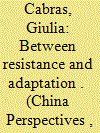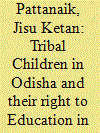|
|
|
Sort Order |
|
|
|
Items / Page
|
|
|
|
|
|
|
| Srl | Item |
| 1 |
ID:
158297


|
|
|
|
|
| Summary/Abstract |
The urban areas of Xinjiang have recently experienced major changes in their demographic, urban, ethnic, and linguistic landscapes. Ürümchi, the capital of the Xinjiang Uyghur Autonomous Region, is a typical example of this. In this city, which is undergoing rapid economic and urban expansion, the Han make up around 72% of the population and the Chinese language is ever more present in the language use of the Uyghurs. This study examines the place of the Uyghur language in the context of the sinicisation of the city of Ürümchi, its role in the daily life of the Uyghur community, and opportunities for its use and revitalisation.
|
|
|
|
|
|
|
|
|
|
|
|
|
|
|
|
| 2 |
ID:
133963


|
|
|
|
|
| Publication |
2014.
|
| Summary/Abstract |
This article discusses the relationship between three language communities in Europe with variant levels of official recognition, namely Kashub, Sorb, and Silesian, and the institutions of their host states as regards their respective use, promotion, and revitalization. Most language communities across the world campaign for recognition within a geographic/political region, or on the basis of a historic/group identity to ensure their language's use and status. The examples discussed here illustrate that language recognition and policies resulting therefrom and promoting official monolingualism strengthen the symbolic status of the language but contribute little to the functionality of language communities outside the area. As this article illustrates, in increasingly multilingual societies, language policies cut off its speakers from the political, economic, and social opportunities accessible through the medium of languages that lack official recognition locally.
|
|
|
|
|
|
|
|
|
|
|
|
|
|
|
|
| 3 |
ID:
172204


|
|
|
|
|
| Summary/Abstract |
Focused on the socio-economic background of tribal students in the 142 ashram schools of Koraput district in Odisha, this article explores the educational environment and quality of education for tribal children in India. As their educational performance is largely unsatisfactory, the primary causes behind low educational achievements are explored. It is found that the educational processes largely disregard the socio-cultural characteristics and linguistic skills that tribal students bring to the classroom. Specifically, tribal children experience serious language difficulties during the initial years of schooling. The practice of using the dominant state language, Odia, as the sole/dominant medium of instruction in all ashram schools, rather than the children’s mother tongue, appears to leave young learners illiterate in their mother tongue and also fosters low achievement levels in the dominant language.
|
|
|
|
|
|
|
|
|
|
|
|
|
|
|
|
|
|
|
|
|